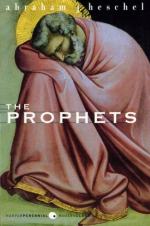
|
| Name: _________________________ | Period: ___________________ |
This test consists of 15 multiple choice questions and 5 short answer questions.
Multiple Choice Questions
1. How does Heschel describe the time that Jeremiah lived?
(a) One of war.
(b) One of peace.
(c) One of anger and wrath.
(d) One of injustice.
2. What does Heschel say that the prophets looked towards?
(a) The time when Israel turns back to God.
(b) The time when they can return to normal life.
(c) The time when people become religious.
(d) The time when God will end all evil.
3. Whom did Jeremiah say would overtake the cities of Judah?
(a) God.
(b) The enemies.
(c) The people who lived in Judah before the Israelites.
(d) The people of the Northern Kingdom.
4. What changed with Second Isaiah?
(a) The king.
(b) The situation.
(c) The people.
(d) The weather.
5. Jeremiah was a prophet when what happened to Jerusalem?
(a) It was the center of culture.
(b) It fell.
(c) It became the capital of the Assyrian empire.
(d) It prospered.
6. What does Heschel see as the point when freedom is lost?
(a) When a person dies.
(b) When a person misuses it.
(c) When God takes it away.
(d) When God hardens a person's heart.
7. Isaiah was aware that disaster was coming and from that disaster would come what?
(a) Redemption.
(b) Exile.
(c) Revenge.
(d) Victory.
8. Who imprisoned Jeremiah?
(a) Canaanites.
(b) Israelites.
(c) Assyrians.
(d) Babylonians.
9. The author states that a prophet looked at things that seemed what to other people?
(a) Sacred.
(b) Extraneous.
(c) Trivial.
(d) Odd.
10. What happened to prophets when God called them to do his work?
(a) They were glorified.
(b) They were honored.
(c) They were shown respect.
(d) They were shunned.
11. According to Heschel, how did God show himself to prophets?
(a) In variables.
(b) In totality.
(c) In absolutes.
(d) In vague notions.
12. The author describes what era in the Old Testament?
(a) Ancient prophets era.
(b) Babylonian exile era.
(c) Prophetic era.
(d) Early Christian era.
13. What promise did God give with Second Isaiah?
(a) Promise of redemption.
(b) Promise of destruction.
(c) Promise of love.
(d) Promise of future wealth.
14. Heschel says that Jeremiah is often called a prophet of what?
(a) Love.
(b) Doom.
(c) Forgiveness.
(d) Wrath.
15. What does Heschel say is the basis for the relationship of God and man?
(a) Love.
(b) Religion.
(c) Divine pathos.
(d) Obedience.
Short Answer Questions
1. What social ill did Hosea primarily speak out against?
2. What term does Jeremiah use for the people of God because they refuse to turn themselves toward God?
3. What did Isaiah say that God would do to those who try to honor themselves?
4. Heschel says that Habakkuk knowing that destruction is coming feels that this is the opposite of what?
5. What did Mesha sacrifice to appease his idols during wartime?
|
This section contains 437 words (approx. 2 pages at 300 words per page) |

|




